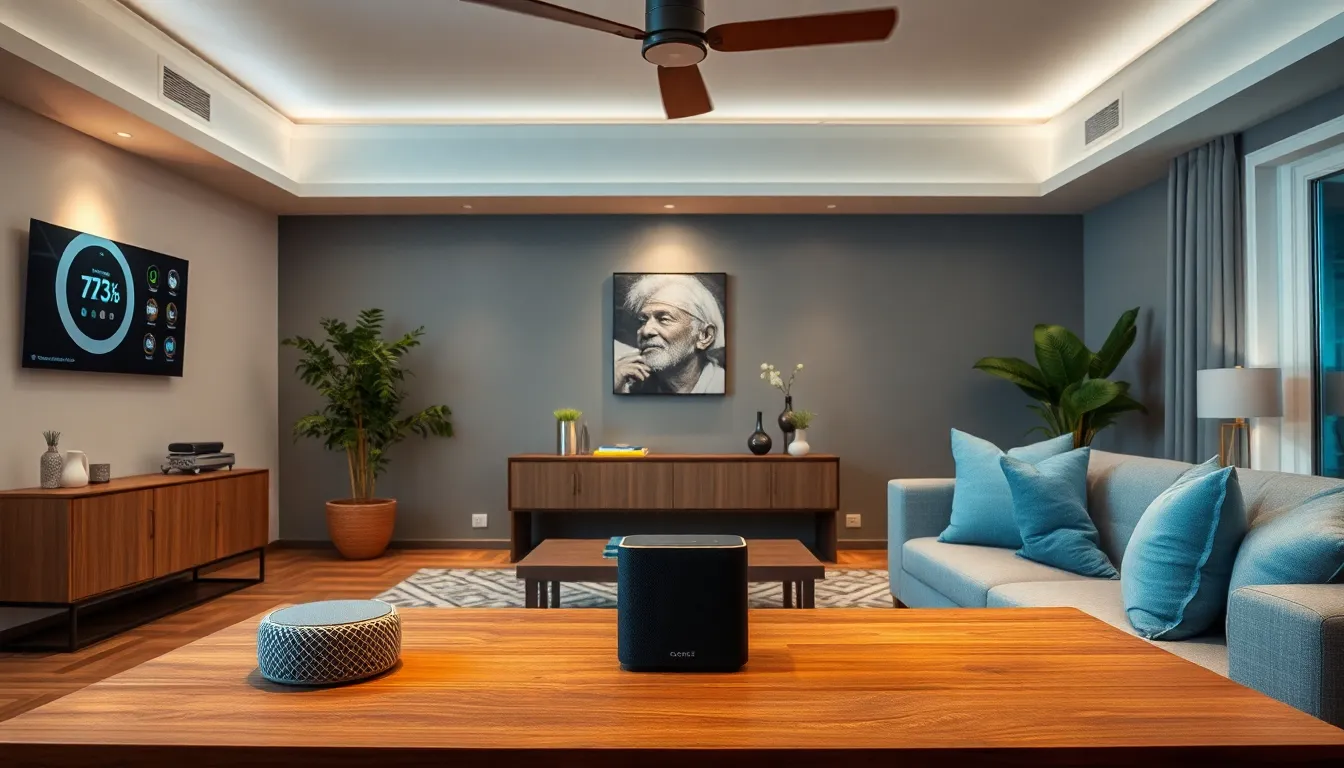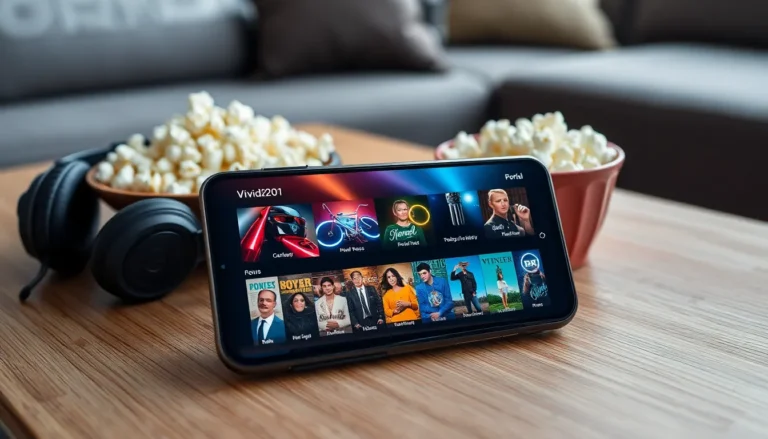Imagine waking up to a home that knows you better than your best friend. With IoT residential solutions, that dream’s not just a fantasy—it’s a reality! These smart technologies turn a regular house into a savvy sanctuary, where your coffee brews itself and the thermostat adjusts before you even step out of bed.
Gone are the days of fumbling for light switches or worrying if you left the oven on. IoT devices create a seamless living experience, making life easier and a lot more fun. Whether it’s smart security systems keeping an eye on your castle or voice-activated assistants ready to entertain, these innovations are transforming how we live. Get ready to embrace a lifestyle where convenience meets cutting-edge technology, and your home truly becomes your happy place.
Table of Contents
ToggleOverview of IoT Residential Solutions
IoT residential solutions represent a significant evolution in home management. These innovative technologies create intelligent environments that improve comfort and convenience.
Definition and Key Features
IoT residential solutions consist of interconnected devices that communicate over the internet. Smart appliances, security systems, and lighting controls exemplify these devices. These solutions often feature remote access, allowing users to monitor and manage their homes from anywhere. Integration with voice-controlled assistants further enhances usability. Adaptability plays a crucial role, as these systems can evolve with user preferences and technological advancements.
Benefits of IoT in Home Automation
Home automation through IoT delivers numerous advantages. Increased energy efficiency reduces utility costs while maximizing comfort. Enhanced security features provide real-time alerts and surveillance options. Automation simplifies everyday tasks, saving time and effort for residents. Furthermore, customization options adapt to individual lifestyles, fostering a personalized living experience. Overall, leveraging IoT in homes enhances quality of life.
Types of IoT Residential Solutions

Various IoT residential solutions enhance home living. They include smart devices, security systems, and energy management tools that work together to create efficient living environments.
Smart Home Devices
Smart home devices automate tasks to improve daily routines. Examples include smart speakers, thermostats, and lighting systems. Smart speakers allow voice control of appliances and offer music streaming. Thermostats learn preferences to optimize heating and cooling. Lighting systems can be programmed to adjust for different times of day, enhancing comfort and ambiance. These devices not only simplify life but also contribute to energy savings.
Home Security Systems
Home security systems provide peace of mind through advanced technology. Smart cameras and doorbell systems allow homeowners to monitor their property remotely. Intrusion detection sensors alert residents to unauthorized entry. Integration with mobile apps enables real-time notifications, ensuring swift action. Features like automated locks enhance security by providing remote access control. Together, these systems create comprehensive safety solutions for modern homes.
Energy Management Solutions
Energy management solutions optimize home resource consumption. Smart meters track energy usage and provide insights into ways to reduce costs. Appliances can be programmed to operate during off-peak hours, taking advantage of lower rates. Solar panel integration allows homeowners to monitor production and consumption in real time. These tools not only contribute to sustainability but also encourage responsible energy use, leading to decreased bills and environmental impact.
Implementation of IoT Residential Solutions
Implementing IoT residential solutions enhances everyday living. This section explores the installation process and the integration with existing systems.
Installation Process
Installation of IoT devices requires careful planning and execution. Technicians often assess each home’s infrastructure, ensuring compatibility with devices like smart thermostats, lighting, and security systems. It’s essential to follow manufacturer’s guidelines for optimal performance. A reliable internet connection supports seamless operation, so homeowners should verify network strength. Local professionals can simplify installation, recommending customized setups tailored to individual preferences. Homeowners frequently benefit from tutorials or guides that help them understand their new devices.
Integration with Existing Systems
Integration fosters a cohesive smart home experience. Many IoT solutions communicate with existing systems, enabling centralized control through smartphones or voice-activated assistants. Compatibility is crucial, as devices must work together harmoniously. Smart home hubs often serve as bridges, allowing diverse products to communicate effectively. Users can schedule routines that synchronize multiple devices for added convenience. Regular updates enhance performance while ensuring security standards are met. Achieving a fully integrated environment greatly improves user interaction and satisfaction.
Challenges and Considerations
IoT residential solutions present unique challenges that require careful consideration. Addressing these concerns ensures a secure and efficient smart home environment.
Privacy and Security Concerns
Privacy remains a primary concern with IoT residential solutions. Users often worry about unauthorized access to their personal data. Many devices collect sensitive information, such as daily routines and activity patterns. Implementing strong security measures is essential. Regular software updates minimize vulnerabilities. Additionally, using complex passwords helps protect accounts from cyber threats. Homeowners should understand privacy policies of devices before purchase. This awareness fosters informed decision-making, promoting a secure living environment.
Interoperability Issues
Interoperability presents another challenge in IoT residential solutions. Devices from different manufacturers often struggle to work seamlessly together. Compatibility issues can lead to frustration when trying to automate functions. Choosing products that adhere to common standards enhances functionality. Smart home hubs bridge gaps between various devices, facilitating communication. Each device’s ability to integrate within a home network improves user experience significantly. Homeowners must research interoperability features before investing in IoT solutions. Prioritizing compatibility fosters a cohesive smart home ecosystem.
Future Trends in IoT Residential Solutions
Emerging trends in IoT residential solutions indicate a shift toward increasingly integrated and intelligent home environments. Continuous advancements in technology will likely pave the way for more sophisticated smart home devices that enhance user experience.
Innovations on the Horizon
Innovations in IoT promise to revolutionize residential settings. Enhanced connectivity enables seamless communication between a growing range of devices, leading to more comprehensive automation. Smart appliances will incorporate adaptive features that learn user preferences over time. Increased focus on sustainability will result in energy-efficient systems that conserve resources while maintaining comfort. New applications in home health monitoring will emerge, showcasing the capabilities of IoT in supporting residents’ well-being. Expect interconnectivity among domestic systems to create a more cohesive living experience.
Impact of AI and Machine Learning
Artificial intelligence and machine learning will significantly influence IoT residential solutions. These technologies can analyze user behavior, leading to personalized automation based on individual habits and preferences. Smart thermostats will adjust temperatures autonomously, optimizing energy use and comfort levels. Predictive analytics will empower security systems to identify potential threats before they occur. Enhanced machine learning capabilities will streamline device interactions, allowing homeowners to manage multiple appliances effortlessly. Furthermore, AI-powered voice assistants will continue evolving, leading to increasingly intuitive and seamless user experiences.
Embracing IoT residential solutions transforms homes into smart environments that prioritize convenience and efficiency. These technologies not only streamline daily tasks but also enhance security and promote energy savings. As homeowners adapt to these innovations, they can enjoy personalized experiences tailored to their lifestyles.
While challenges like privacy and interoperability exist, careful planning and informed choices can mitigate risks. The future of IoT in residential settings looks promising with advancements in artificial intelligence and sustainability. As homes evolve into intelligent spaces, the integration of smart technologies will continue to improve quality of life, making everyday living more enjoyable and secure.


